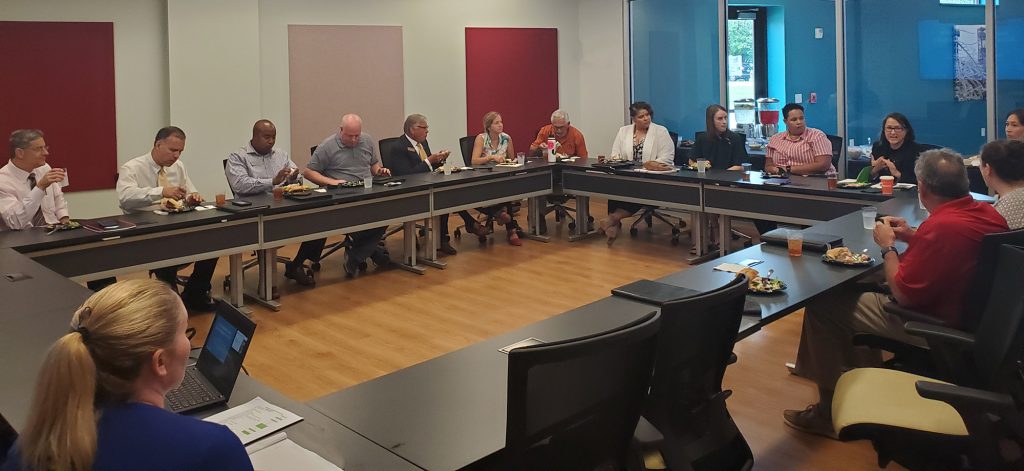
At the start of the COVID-19 pandemic, many shelves were empty and things like toilet paper, hand sanitizer and personal protective equipment (PPE) were difficult to find. This moment highlighted the fragility of global supply chains, which has continued to cause challenges through the pandemic’s two-year duration. Sitting in North Carolina, where we have a history of success in manufacturing and a thriving ecosystem full of entrepreneurs and innovative small businesses, the CREATE team at the Kenan Institute of Private Enterprise couldn’t help wondering whether more local businesses could help fill this void.
Our team kept coming back to a project we worked on with the University of North Carolina at Pembroke (UNCP) back in 2016-2017. At that time, UNCP Chancellor Dr. Robin Cummings and the Thomas Entrepreneurship Hub at UNCP led by Executive Director Thomas Hall, were interested in exploring ways to increase the university’s economic impact on the local community. As a university that spends nearly $48 million on goods and services each year, UNCP has tremendous purchasing power. Given this, UNCP redirected a portion of its spending to small local businesses to help these businesses grow and create more good jobs. Given the campus location in an agriculturally rich region and interest across campus in bringing more local foods into the dining facilities, UNCP decided to focus its efforts on purchasing more of its produce from local vendors. Over the course of the project, UNCP increased the share of produce purchased from local vendors from 2% to 16% of the total. This redirection of funds allowed Pembroke businesses to grow and hire more community members, and others to start—including MG3 Farms, featured in this video and at the bottom of this article, a Native-owned hydroponics business that now supplies most of the romaine lettuce on UNCP’s campus.
Having seen the success of UNCP’s commitment to purchasing more of the produce they needed from local farms, the CREATE team felt certain that this type of intentional and targeted purchasing from anchor institutions—local governments, universities, hospitals, military bases—could help Carolina communities rebuild in the wake of the pandemic, while helping build a more resilient and equitable economy in the long term. This led to the launch of AICER, or Anchor Institutions Create Economic Resilience, a program that helps anchor institutions purchase with purpose. AICER works to get more dollars into the communities that most need it by supporting traditionally under-resourced businesses in becoming vendors to anchor institutions. Specifically, CREATE targets businesses that are: local to the anchor institution partner; Black, Latinx or Native-owned; in rural communities and/or disproportionately impacted by the COVID-19 pandemic.
CREATE continues its work with UNCP, expanding the scope to support other types of businesses beyond those in agriculture in becoming vendors with the university. Additionally, CREATE entered a partnership with the North Carolina Military Business Center (NCMBC), a statewide business development entity of the North Carolina Community College System. With NCMBC, we are working to get more local and minority-owned vendors into the supply chains of North Carolina’s military bases. On May 4, CREATE will partner with the NCMBC and other co-hosts on a Regional Military Small Business Outreach and Vendor Event that aims to bring more of these businesses into Seymour Johnson Air Force Base’s supply chain. During this event, businesses will have the opportunity to meet with and hear from those making purchasing decisions at Seymour Johnson Air Force Base (SJAFB). They will also learn how to become a vendor to SJAFB and receive information about the specific goods and services SJAFB regularly purchases. Additionally, select attendees will have an opportunity to showcase their businesses during an afternoon vendor exhibit.
Additional anchor institution partners include the University of North Carolina at Chapel Hill, Claflin University, Fayetteville State University and United South and Eastern Tribes. We have the capacity to grow and are looking for additional anchor institution partners. Please email the CREATE team to discuss partnership opportunities or learn more.
AICER is made possible by funding from the Truist Foundation, Economic Development Administration, JP Morgan Chase and the Golden Leaf Foundation. CREATE is a university center building new wealth in economically distressed communities through job/business growth, research and policy. Learn more at createprosperity.unc.edu.
